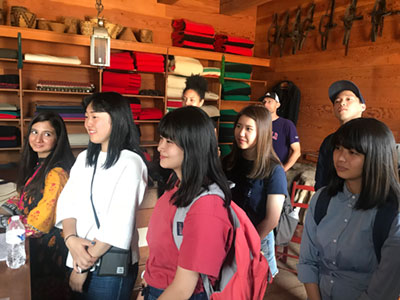Prepare to arrive/post-arrival
Preparing to arrive
Applying for a U.S visa
Once you have been accepted and admitted to Linfield University, an I-20 or DS-2019 will be sent to you. You will need this to apply for your U.S visa. You should apply for a visa at the nearest U.S. embassy or consulate in your home country. If you have been accepted by multiple colleges or universities in the U.S., you should wait to apply for your visa until you decide which institution you want to attend. Only use the Linfield I-20 form to apply for a visa if you plan to attend Linfield. The following steps will need to be completed before you can apply for your visa
- Receive I-20 or DS-2019
- F-1 Students: You will receive a SEVIS form I-20 Certificate of Eligibility for Nonimmigrant Student Status for Academic and Language Students. Complete item 11 on page 1 of the I-20.
- J-1 Students: You will receive a DS-2019 Certificate of Eligibility for Exchange Visitor Status. Sign the bottom of page 1.
- Pay the SEVIS (I-901) fee
- The SEVIS fee MUST be paid before your visa interview. You may pay the SEVIS fee by credit card, check or bank draft from a U.S. bank, by international money order, or through Western Union. The I-901 Website will provide more important information on fees and payment methods.
- Apply for U.S visa
- We recommend applying for visa as soon as possible. This will help you when you are making your final arrangements to come to Linfield. The U.S consulate website for your country will provide you with information on the visa application process. Please note that Canadian citizens do NOT need to apply for the F-1 or J-1 visa.
Have questions? Contact mmoonfall@linfield.edu.
Housing
Linfield students are required to live on campus for three years unless they meet certain requirements, such as age. Approximately a day or two after you are accepted to Linfield, you will be contacted directly by housing to begin the housing application. Learn more about living at Linfield.
Medical insurance
All international students are required to purchase student health insurance from Linfield. The student will automatically be billed for this.
Immunizations
Linfield University requires that you have documentation of two doses of MMR (measles, mumps, and rubella).
Register for classes
If you are a degree seeking student, you will be able to enroll in courses before you arrive at Linfield. Before you can enroll, you will need to complete several forms. Please review the New Incoming Students | Linfield University. This checklist will walk you through all the steps you need to take to enroll.
What to bring
Oregon weather requires clothing for a variety of seasons. We recommend you bring a warm jacket, scarf, gloves, and a few sweaters. Oregonians are quite casual, so informal clothing is fine for most daytime activities. Basic bedding items will be provided for you, including sheets, pillow, pillowcase, towel, and a blanket.
Post-arrival
Mandatory orientation for new students
International Student Orientation will begin the day before regular student orientation.
Language assessment
If English is not your first language, an assessment meeting is required with the professors of our English Language & Culture Program (ELCP). Based on your English language exam score you submitted with your application, you may be tentatively exempt from any ELCP courses, or tentatively scheduled in courses. The ELCP program will then conduct a brief oral interview and English language assessment during the orientation period. This assessment will finalize the determination of your appropriate ELCP coursework.
Get involved
During international orientation as well as the Linfield orientation, you will be presented with lots of information about activities and ways to get involved at Linfield. Additionally, there is a student activities fair during orientation week or in the week after. Attend it! Find clubs that interest you, sign up for trips, make connections. The U.S college experience is not just about academics, but about the social connections you make. Not only will it be more fun for you, but having a good support group will help you succeed!
